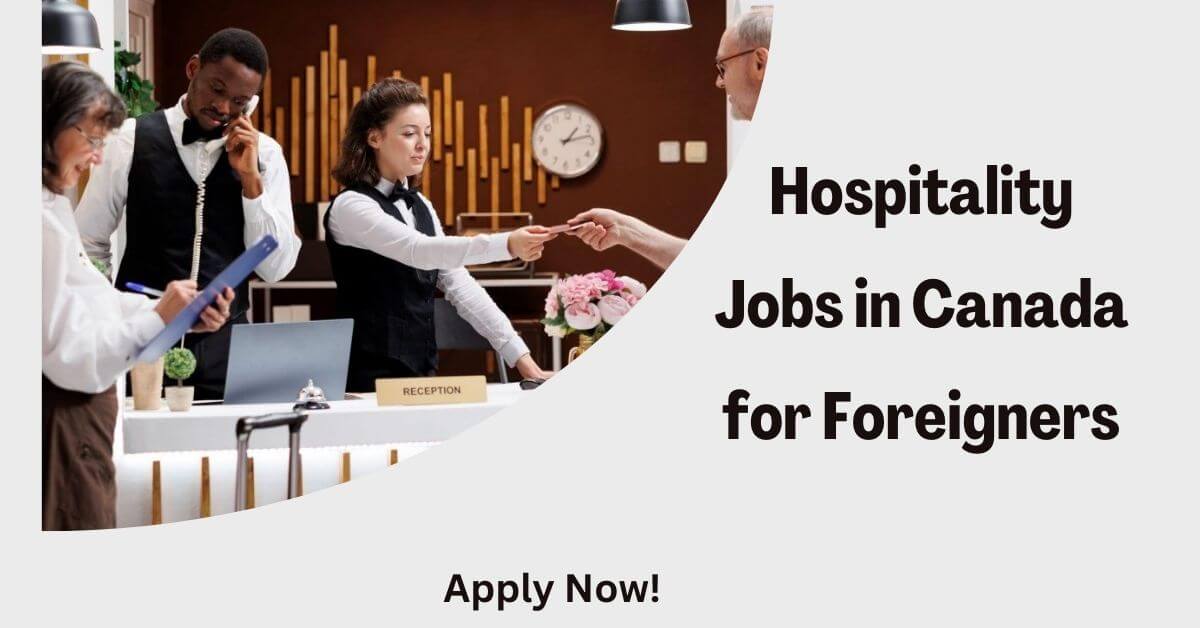COVID-19 heavily impacted Canada’s economy, hitting the tourism and hotel sectors hardest. Many restaurants and hotels saw sharp revenue and staff declines due to border closures. Now is an ideal time for foreigners to join Canada’s hospitality industry, which offers jobs with salaries ranging from CAD 35,000 to 55,000 per year and requires 1–3 years of experience. The government has added 35,000 temporary worker permits, creating flexible opportunities in hotels, restaurants, and resorts.
Details of Hospitality Job in Canada:
- Salary: CAD 35,000–CAD 55,000 per year
- Title: Hospitality Jobs in Canada for Foreigners
- Job Type: Full-time, part-time, seasonal
- Country: Canada
- Title: Hospitality Jobs for Foreigners 2026
- More: Opportunities in hotels, resorts, restaurants, and event management
Key Responsibilities:
- Greeting and helping people in a friendly and professional way.
- Taking care of bookings, check-ins, and bills.
- Keeping cleanliness, safety, and the standard of service high.
- Organizing parties and food service.
- Taking care of guest complaints and comments quickly.
Job Requirements:
- Hospitality or customer service knowledge that can be shown.
- Strong people skills and the ability to talk to others.
- Being able to work in places that are busy and hard on the body.
- Being able to change shifts, weekends, and vacations as needed.
- Depending on the area, they should be able to speak English or French.
Read Also: Hospitality Jobs In Luxembourg With Visa Sponsorship
Benefits of Job:
- Access to a Larger Talent Pool: Employers can hire skilled foreign workers to meet high demand.
- Dependability and Loyalty: Foreign employees often stay longer due to visa sponsorship.
- Diverse Perspectives and Cultural Enrichment: Promotes inclusive workplaces and better customer experiences.
- Multilingual Capabilities: Helps businesses serve international clients effectively.
- Professional Growth and Skill Development: Opportunities to learn, collaborate, and advance careers.
Types of Hospitality Jobs in Canada (2026)
1. Hotel Front Desk Officer:
- National Average Salary: CAD 38,000 per year
- Primary Duties: Welcome guests, manage check-ins/check-outs, and handle reservations efficiently while ensuring customer satisfaction.
- Experience: 1–2 years in hospitality or customer service; strong communication skills required.
2. Restaurant Manager:
- National Average Salary: CAD 50,000 per year
- Primary Duties: Oversee restaurant operations, supervise staff, maintain service standards, and manage inventory and budgets.
- Experience: 2–3 years in restaurant management or supervisory roles; leadership skills essential.
3. Housekeeping Supervisor:
- National Average Salary: CAD 42,000 per year
- Primary Duties: Ensure cleanliness, monitor housekeeping staff, maintain hygiene standards, and manage supplies.
- Experience: 1–3 years in housekeeping or facility management; attention to detail critical.
4. Event Coordinator:
- National Average Salary: CAD 45,000 per year
- Primary Duties: Plan, organize, and execute events, manage vendors, and ensure client satisfaction from start to finish.
- Experience: 1–2 years in event planning, hospitality, or related fields; excellent organizational skills required.
5. Food & Beverage Attendant:
- National Average Salary: CAD 35,000 per year
- Primary Duties: Serve food and beverages, maintain cleanliness, assist kitchen staff, and provide excellent customer service.
- Experience: 1 year in food service or hospitality; good communication and teamwork skills needed.
Application Process:
Use a reputable website to apply, like Indeed or Glassdoor. Carefully send in all of your papers to make sure your application is processed quickly.
Conclusion:
The booming hospitality sector in Canada offers a plethora of prospects for international workers in 2026. The moment to investigate hospitality professions in Canada is now, with assistance in the form of visa sponsorship and major advantages, including professional development, multicultural team environments, and a steady work market. Canada offers the routes to long-term professional success, whether it’s your interest in entry-level professions or your desire to progress in hotel management or specialized roles.
Frequently Asked Questions:
What educational background is required?
Entry-Level: High school diploma or equivalent, with prior customer service experience.
Advanced Roles: Specialized training in hospitality or business administration may be needed.Do foreign workers receive support for applying?
Yes, the Canadian government provides visa assistance to ensure smooth transitions for foreign workers.






